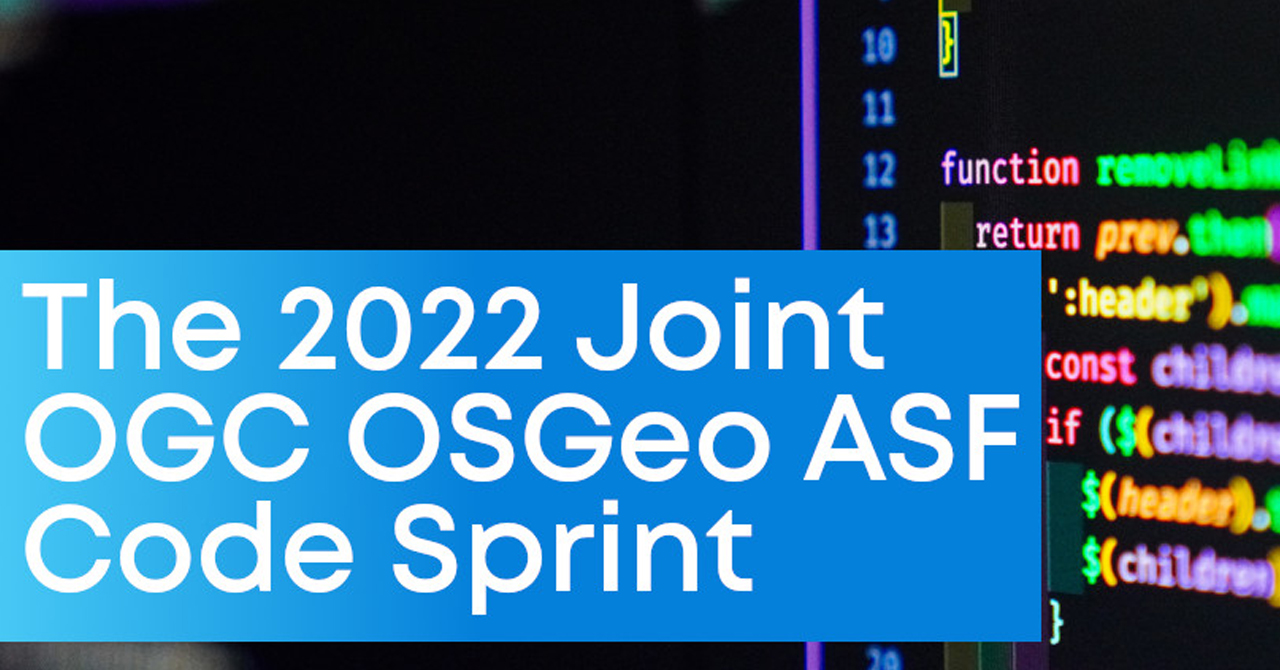Over the past decade, geospatial technologies and data have become more widespread in use and application. A key catalyst for the increased uptake of geospatial technologies is the interoperability achieved through the implementation of Open Standards. Another important catalyst for this increased uptake is the availability of Open Source software products that are able to extract, transform, analyze, and disseminate geospatial data.
Back in February 2021, the Open Geospatial Consortium (OGC), the Apache Software Foundation (ASF), and the Open Source Geospatial Foundation (OSGeo) held their first joint Open Source Software and Open Standards Code Sprint (for full technical outcomes, see the Joint OGC OSGeo ASF Code Sprint 2021 Summary Engineering Report).
The success of that first joint code sprint provided the foundation for a second joint code sprint in March this year. The 2022 Joint OGC OSGeo ASF Code Sprint, conducted between March 8-10, had the goal of accelerating the support of open geospatial standards within the developer community.
Part of the motivation for holding the code sprint in 2022 was the growing uptake of location information across the global developer communities. The code sprint brought together developers of Open Standards, Open Source Software, and Proprietary Software. The code sprint therefore provided a rare opportunity for developers across these communities to focus on common challenges, within a short space of time, and in a shared collaborative environment.
The 2022 Joint Code Sprint introduced several changes not seen during the 2021 Joint Code Sprint:
First, Discord was used to aid in collaboration. Discord allowed both chat and video communications to be offered from within the same environment. Discord also supported the creation of multiple chat channels, thereby making it possible for separate projects to have their own dedicated chat channels. Included in these channels was a dedicated chat channel for the event sponsor, OGC Strategic Member Ordnance Survey, which made it possible for sprint participants to visit the channel and ask about the sponsor’s products.
Second, the code sprint offered Mentor Streams that presented tutorials for developers who were new to using featured standards or software products.
Over a period of 3 days, the sprint participants collaborated on a variety of coding and documentation tasks, and held discussions to facilitate coordination. The sprint participants made the following recommendations for future innovation work items:
- Prototypes of catalogs that can be crawled by an application. While there are currently several searchable catalogs, no catalogs can yet be crawled through by applications.
- More specification validation work for OGC API Records.
- More experiments for the Workflows extension of OGC API Processes. This could try out a variety of workflow approaches.
- Experimentation on how a processing server can interact properly with other OGC API implementations that serve data. For example, in this code sprint there was an implementation of OGC API Processes (ZOO Project) that interacted with an OGC API Features implementation (MapServer).
- Experimentation with OGC’s geoparquet candidate standard and Apache Arrow.
The sprint participants also made the following recommendations for things that the Standards Working Groups should consider:
- To improve examples and documentation related to OGC API Records.
- To advance the development of the Executable Test Suites of OGC API Processes, OGC API Tiles, and OGC API Coverages.
The code sprint facilitated the development and testing of prototype implementations of OGC standards, including implementations of draft OGC API standards. Further, the code sprint also enabled the participating developers to provide feedback to the editors of OGC standards. Furthermore, the code sprint provided a collaborative environment for OSGeo and ASF developers to fix open issues in products, develop new features, improve documentation, improve interoperability with other libraries/products, and develop prototype implementations of OGC standards. The code sprint therefore met all of its objectives and achieved its goal of accelerating the support of open geospatial standards within the developer community.
Keep your eye out for the forthcoming Joint OGC OSGeo ASF Code Sprint 2022 Summary Engineering Report that will document the technical achievements of the code sprint, available July ‘22.
